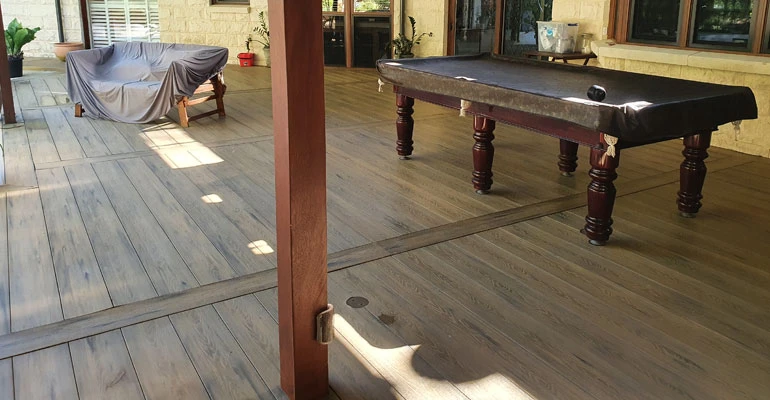Whether you are looking to build a new pool or restore an existing one, a perfect pool deck is essential. Pool decks are the transitional area that connects the pool to its surroundings. It enhances overall aesthetics, safety, and comfort.
Choosing the right deck material is especially important for above-ground pools. This is because it directly affects the experience, maintenance costs, and long-term durability. In this article, we will analyze the advantages and disadvantages of each type of pool deck material. You can combine the actual needs and make the best choice.
Why do I Need Pool Decks?
Above-ground pool decking is not just for decoration, it has a number of practical functions:
- Enhanced Aesthetics: Makes above-ground pools look more like built-in pools, blending in with the yard landscape.
- Improves Safety: Provides stable access and reduces the risk of slips and falls.
- Reduces Pollution: Prevents dirt, grass, leaves, and other debris from entering the pool, reducing the burden of cleaning.
- Improves Comfort: Avoids mud and wetness around the pool, creating space suitable for lounging and sunbathing.
- Enhanced Functionality: Conveniently observe the situation inside the pool.
Key Factors in Choosing Pool Deck Materials
As with all decks, an above-ground pool deck needs to be weather, insect, mold, and rot resistant. In addition, it needs to be in constant contact with large amounts of water. This is why pool decks need to be better at waterproofing. When you are ready to pick the best pool deck, you should consider all of the following things:
Aesthetics
The deck material should harmonize with the style of the house and the landscape of the yard. Wood or composite decking has a natural texture. Tiles have a sophisticated look. They can bring different visual effects. Therefore, choosing the right material can add beauty and value to your home.
Comfort
Pool decks are often stepped on by bare feet. For safety, pool deck materials should have the following properties:
- Slip Resistance: Pool decks need to provide enough friction when wet to prevent you from falling while walking.
- Heat Resistance: Avoid overheating in the hot sun and burning the soles of your feet.
- Comfort to the Touch: The surface should not be too rough or sharp.
Durability
The pool environment is a great test of the durability of the material, which needs to be considered when choosing:
- Waterproof and Mold Resistant: Pool decks have to be in contact with water for a long time. Therefore, the deck material needs to have the ability to resist mold and water.
- UV Resistance: Direct sunlight may cause some materials to fade or deteriorate. Therefore, you can choose composite deck or tile and other materials with strong UV resistance.
- Chemical Resistance: Pool sanitizers (e.g., chlorine) may erode certain materials. Therefore, pool decks need to be resistant to corrosion.
Maintenance and Cleaning
Maintenance needs vary greatly from material to material. This is something you need to take into account when choosing a material. Some materials require frequent maintenance and cleaning. If you don’t want to spend too much time cleaning your deck, COOWIN composite decking is a great choice.
Budget
Of course, price is always a major point to consider. When you’re choosing a pool deck material, compare the upfront cost of the material to the long-term maintenance costs. For example, wood is initially cheap but high maintenance, while composite materials are initially more expensive but require little maintenance.

